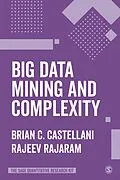This book offers a much needed critical introduction to data mining and 'big data'. Supported by multiple case studies and examples, the authors provide:
- Digestible overviews of key terms and concepts relevant to using social media data in quantitative research.
- A critical review of data mining and 'big data' from a complexity science perspective, including its future potential and limitations
- A practical exploration of the challenges of putting together and managing a 'big data' database
- An evaluation of the core mathematical and conceptual frameworks, grounded in a case-based computational modeling perspective, which form the foundations of all data mining techniques
Autorentext
In addition to being a Professor of Sociology at Durham University, I am currently Adjunct Professor of Psychiatry (Northeast Ohio Medical University), Fellow of the Wolfson Research Institute for Health and Wellbeing, and Co-Editor of the Routledge Complexity in Social Science series. I am also a member of the editorial board for International Journal of Social Research Methodology and Complexity, Governance and Networks.
Trained as a sociologist, clinical psychologist and methodologist (statistics and computational social science), I have spent the past ten years developing a new case-based, data-mining approach to modeling complex social systems - called the SACS Toolkit - which my colleagues and I have used to help researchers, policy makers and service providers address and improve complex public health issues such as community health and well-being; infrastructure and grid reliability; mental health and inequality; big data and data mining; and globalization and global civil society. We have also recently developed the COMPLEX-IT R-studio software app, which allows everyday users seamless access to such high-powered techniques as machine intelligence, neural nets, and agent-based modeling to make better sense of the complex world(s) in which they live and work.
Inhalt
Chapter 1: Introduction
Part 1: Thinking Complex and Critically
Chapter 2: The Failure of Quantitative Social Science
Chapter 3: What is Big Data?
Chapter 4: What is Data Mining
Chapter 5: The Complexity Turn
Part 2: The Tools and Techniques of Data Mining
Chapter 6: Case-Based Complexity: A Data Mining Vocabulary
Chapter 7: Classification and Clustering
Chapter 8: Machine Learning
Chapter 9: Predictive Analytics and Data Forecasting
Chapter 10: Longitudinal Analysis
Chapter 11: Geospatial Modeling
Chapter 12: Complex Network Analysis
Chapter 13: Textual and Visual Data Mining
Chapter 14: Conclusion: Advancing A Complex Digital Social Science
